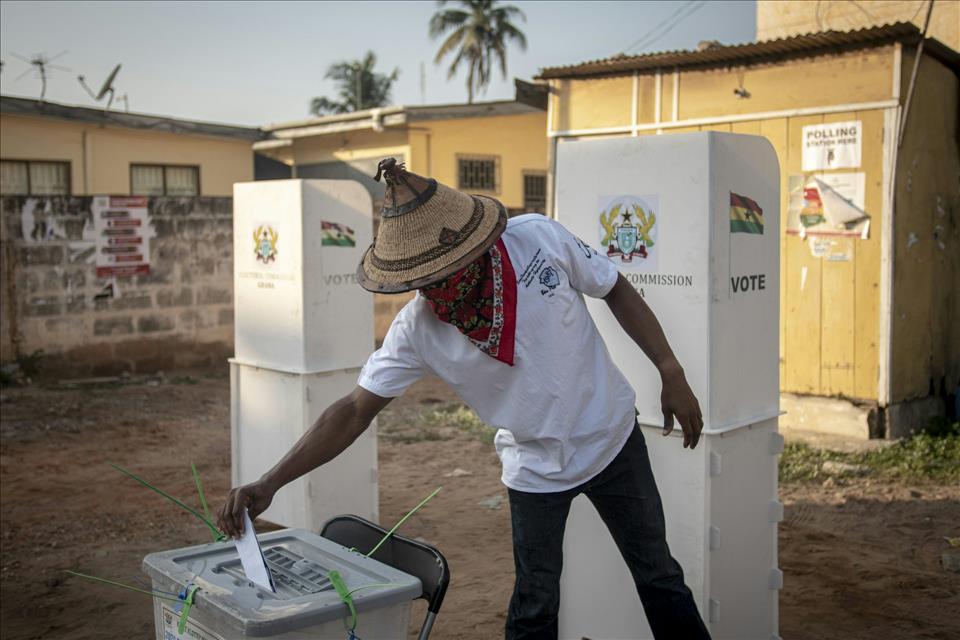
Ghana Elections: Swing Voting Is On The Rise, Shaping Outcomes A Look At What's Driving This
We discovered this trend in a study, which corroborates others .
We define a swing voter as someone who has voted for a different party in the previous four presidential elections or one who has cast a split-ticket ballot during that period.
As researchers of democratic developments on the African continent, we were interested in the increasing power swings on the continent, especially Ghana.
Ghana, which held its last elections in 2020, is scheduled to go to the polls in December 2024 .
We surveyed over 3,000 voters randomly selected from 33 of Ghana's 275 constituencies . We also sampled different regions . We included the Greater Accra region for its demographic diversity and status as the national capital.
From our data, 29.69% of respondents reported they had voted across party lines before in presidential or parliamentary elections since the 2008 elections. That is, almost three in 10 of the Ghanaians in our study had cast a swing vote before. In 2000, only 13% of Ghanaian voters were swing voters.
The data showed that clientelism (the practice of distributing material benefits in return for political allegiance) fails to explain this change. Perceptions of party performance have become more important.
We found that those most likely to change support between elections were men, older voters and people with more schooling. The least likely swing voters according to ethnic group were Ashantis and Ewes . However, Ewes were more likely than other groups to cast a split-ticket vote.
The rising share of swing voters in the country's elections may be good for the country. It creates uncertainty in electoral outcomes, which should encourage more political accountability and responsiveness to voters' needs. It also creates more competitive and issue-focused electoral environments.
Clientelism's roleClientelism is publicly frowned upon in Ghana, but it has been widespread in the past. Even in the Fourth Republic , which began in 1992, major political parties like the National Democratic Congress and the New Patriotic Party continue to engage in patronage , often using state resources to win voter support. This practice has contributed to socio-economic inequalities. It has enabled the political elite to reinforce power structures by focusing limited resources on voters whose loyalties are most easily swayed by modest material inducements.
There are two forms of clientelism: positive and negative . Positive clientelism is the use of gifts or promises of gifts to buy electoral support. Negative clientelism refers to threats of violence or losing gifts if voters fail to vote as expected.
In our study, core voters (individuals who have voted for the same party in the last four presidential and parliamentary elections) were more likely to report that they received gifts or promises of favours from their party. They also reported that those gifts were important to their vote choices. Specifically, voters who reported receiving gifts from a political party before elections were 23% less likely to vote for the other party.
However, for voters who reported experiencing threats of violence or forfeiture of benefits, the likelihood of swing voting was higher. That is, when voters are threatened, they were found to be 24% more likely to revolt by casting swing votes.
This implies that positive clientelism might still help maintain party loyalties, but negative clientelism might turn people into swing voters. This dynamic might also imply a backlash against coercive tactics, a trend that fuels the growing tendency for voters to take political parties' gifts but vote against them anyway.
Read more: Why members of parliament in Ghana can get away with ignoring voters
Political party performanceOne of the strongest determinants of swing voting was found to be voters' perceptions of party performance. Voters who prioritised the performance records of political parties, particularly in terms of public goods provision and governance, were 48% more likely to report having cast a swing vote before.
This suggests that a growing number of voters in Ghana are moving away from clientelist-driven voting and are instead evaluating political parties based on their ability to deliver on campaign promises and improve national welfare.
Demographic factorsThe analysis also highlighted certain demographic factors that influence swing voting. For instance, older voters, urban residents, and those with higher levels of education were more likely to be swing voters. These groups of voters are more likely to have greater access to political information and a higher political awareness, allowing them to focus more on policies than on partisan ideologies.
Gender differences were also noted, with females being less likely to swing their vote compared to males. Ethnic factors were significant as well, with certain ethnic groups, such as the Ashanti and the Ewe, being less likely to swing their vote. The Ashanti have historically rallied around the New Patriotic Party while the Ewe rallied around the National Democratic Congress because these parties were seen as representing the interests of their ethnic groups.
The Ewe were one of the leading split-ticket voting groups in the country, however – mainly in regions outside of their home Volta Region.
The findings of our study suggest that the traditional models of Ghanaian electoral behaviour, which emphasise clientelism and ethnic loyalty, don't explain the dynamics of contemporary elections.
The shift towards performance-based voting could have significant implications for political parties. Those that fail to deliver on their promises or that rely too heavily on clientelist strategies may find it difficult to maintain their electoral base.

Legal Disclaimer:
MENAFN provides the
information “as is” without warranty of any kind. We do not accept
any responsibility or liability for the accuracy, content, images,
videos, licenses, completeness, legality, or reliability of the information
contained in this article. If you have any complaints or copyright
issues related to this article, kindly contact the provider above.


















Comments
No comment